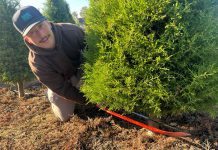San Benito County has lost one of its most honored and faithful
champions.
Howard W. Harris, dubbed by many of his peers as a
”
living legend,
”
died Sunday at St. Louise Regional Medical Center after a long
battle with cancer, diabetes and related health complications.
San Benito County has lost one of its most honored and faithful champions.
Howard W. Harris, dubbed by many of his peers as a “living legend,” died Sunday at St. Louise Regional Medical Center after a long battle with cancer, diabetes and related health complications.
Harris, a fourth-generation resident of San Benito County, once claimed his “roots here go pretty deep,” beginning with his great-grandfather who arrived in California with Col. John C. Fremont, for whom Fremont Peak is named.
San Benito County Water District Manager John Gregg regarded Harris as a man with great focus on the issues and the energy to overcome incredible odds.
“Howard was an enormous contributor to the county in many ways,” he said. “I came quickly to know him and considered him an elder of the tribe.”
Between Harris’ memory and his personal library, Gregg said one could find the county’s history of land use at their fingertips. But what was impressive was the information Harris had right at the top of his mind.
“He’s one person who made a difference,” Gregg said.
Mildred Freeborn of the San Benito County Farm Bureau regarded Harris as a good friend and a man who leaves a legacy of many firsts.
“What made him stand out was being Howard himself,” Freeborn said.
Many people who knew Harris commented he wasn’t afraid to toot his own horn. “But not in an egotistical sense he wanted people to learn,” said Freeborn.
County Supervisor Ron Rodrigues was fond of Harris, whom he met many years ago. When Harris was first diagnosed with cancer, doctors told him time was running out, Rodrigues recalled.
“He fooled them,” he said. “He had a lot of will power.”
Farm Bureau Director Albert Bonturi called his friend a “jack of all trades, writing books, legislation – a man who worked hard to bring the blue valve water into the county.
“He was quite a guy,” Bonturi said. “That’s why we named our building after him.”
Before Hollister Hills State Vehicular Recreation Area was born, it was known as “Howard’s private motorcycle park.” Harris later sold the land to the state.
“Howard had his hands in just about everything,” Bonturi said.
From state and local legislative matters, Harris oversaw local issues by attending meetings on behalf of agriculture and other interests in the community.
“Howard never stopped,” said Joe Zanger, who was 10 years old when he met Harris at a 4-H meeting. “He was doing magic tricks for the kids and he stood out. He was tall, he had a deep voice and he had that ‘matter of fact’ approach.”
Zanger met Harris in 1980 when he joined the Farm Bureau and worked closely with him for the next 20 years.
“When I joined, he had been a member for 30 years. Howard definitely had opinions about most things,” Zanger laughed.
Harris always encouraged people to become involved and was supportive of them, Zanger said.
“He nudged me along when I got involved in the farm bureau,” he said.
When Harris’ health began to fail, Gregg met with him to discuss the county’s water issues and what needed to be done.
“We had meaningful conversations,” Gregg said. “He had a list of what needed to be worked on and many things on his list fell under the list that I’m working on.”
Though his health was deteriorating, Harris would still stand on the floor of the state Legislature and give his opinion.
“He was one of those members you don’t forget,” said Bob Krauter, publisher of Ag Alert, a newsletter of the state agriculture industry. “He is the best example of what leadership can achieve as an Individual. He was very bright, very articulate, respectful of others opinion and he thought a lot about the issues.”
California Farm Bureau Foundation President Bill Pauli called Harris “one of a kind.”
“He is the epitome of voluntary leadership, devoting so much of his time over the years to Farm Bureau activities at all levels of our organization county, state and national,” Pauli said.
Harris served as director of the San Benito County Farm Bureau for 75 years, was county president, chaired numerous Farm Bureau committees, served as a California Farm Bureau director and delegate to CFBF and American Farm Bureau annual meetings.
In 1970 he received the CFBF’s highest honor, the Distinguished Service Award, in recognition of the significant contributions he has made to agriculture.
“He will be deeply missed,” Pauli said.
Harris is survived by his wife of 20 years, Bess; his sons, Donald Harris and Glenn Harris, both of Ridgecrest, and Marvin Harris of Alabama; and many grandchildren and great-grandchildren.
He was preceded in death by his first wife, Florence, in January, 1982, and his daughter, Martha Heim.
At Harris’ request, arrangements have been made for private cremation through Grunnagle-Ament-Nelson Funeral Home. Private inurnment will follow.
Memorials are preferred to the San Benito County 4-H Council, the American Cancer Society or the American Diabetes Association, in care of the funeral home.
Howard Harris: A man who got things done
It is hard to conceive by the accomplishments in Howard Harris’ life that he was banished from the city of Oakland at the age of 4 for being an arsonist, a burglar and a thief.
Deemed “unmanageable,” Harris was sent to live with his grandfather, Marion Crow, in the Cienega Hills south of Hollister, miles away from any neighbors.
At one time Harris was even expelled from grammar school, but that didn’t stop him from graduating from the University of California, Berkeley in 1933 with highest honors.
Harris was awarded numerous memberships, including Phi Beta Kappa; National Scholastic Honor Society; Phi Sigma; National Biological Research Honor Society; Alpha Zeta; National Agricultural Honor Society and Sigma XI National Sciences Honor Society.
Harris also authored county ordinances on planning and zoning, including the county’s first dog ordinance, along with air pollution, septic tanks and mining ordinances.
The California Highway Patrol honored Harris for the first legislation regulating off-highway vehicle use.
In 1953, Harris was the main author of legislation that formed the San Benito County Water Conservation and Flood Control District under which the Hernandez Reservoir and Paicines Reservoir improvements were built.
In 1967, he helped to rewrite the San Benito County Water Conservation and Flood Control District Act.
Because of Harris’ dedication, he was recognized by former Presidents Bill Clinton, Ronald Reagan and Richard Nixon and former California Governors Pete Wilson and Reagan.
Harris was also a member of former President Dwight Eisenhower’s White House Committee on Education.
In 1970, the California Farm Bureau honored him with the Distinguished Service Award. In 1973, Harris was recognized by the U.S. Department of Interior for his conservation work.
Harris also served the longest period of any 4-H leader in the county – more than 66 years – and was named Hollister’s Citizen of the Year in 1985 and again in 1997.
In 1997, the San Benito County Farm Bureau dedicated its new office building on San Benito Street to Harris, recognizing him as one of the county’s most influential individuals who knew how to get things accomplished.









